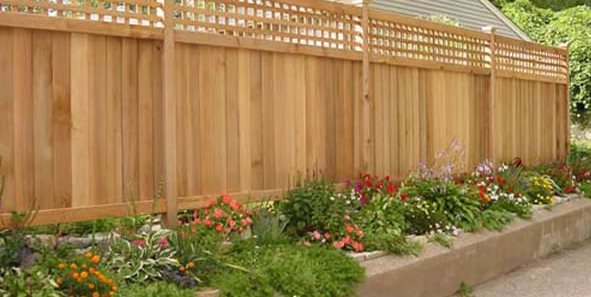Wood fencing is a classic and timeless way to add beauty and privacy to any property. It provides a natural look and feel that complements any landscape. When it comes to choosing the right wood for your fencing, there are several factors to consider. Cedar, pine, and redwood are some of the most popular wood options for fencing. Each wood type has its unique features, advantages, and disadvantages that make it ideal for different situations.
In this article, we will discuss the differences between cedar, pine, and redwood for wood fencing, and which one is the best for your project.
Contents
Cedar Wood Fencing
Cedar wood fencing is a popular choice for its natural beauty and durability. Cedar has natural oils that make it resistant to decay and insect infestations, making it a great option for outdoor use. The wood has a reddish-brown hue that creates a warm and inviting look that complements any landscape. Cedar is also easy to work with, making it a favorite among DIY enthusiasts.
One of the biggest advantages of cedar wood fencing is its longevity. Cedar wood can last up to 20 years or more with proper maintenance. The wood requires regular sealing and staining to protect it from moisture and sunlight damage. However, cedar wood fencing can be more expensive than other wood options, which can be a drawback for some homeowners.
Pine Wood Fencing
Pine wood fencing is another popular option for its affordability and versatility. Pine wood has a light, yellowish color that can be stained or painted to match any design style. Pine wood is easy to work with, making it a favorite among DIY enthusiasts.
One of the biggest advantages of pine wood fencing is its affordability. Pine wood is readily available and less expensive than cedar or redwood. However, pine wood is less durable than cedar or redwood and requires more maintenance to prevent decay and insect infestations. Pine wood fencing typically lasts between 5 to 12 years with proper maintenance.
Redwood Wood Fencing
Redwood wood fencing is a high-end option for its natural beauty and durability. Redwood has natural oils and tannins that make it resistant to decay and insect infestations, making it ideal for outdoor use. The wood has a reddish hue that creates a luxurious and elegant look that complements any landscape. Redwood is also easy to work with, making it a favorite among DIY enthusiasts.
One of the biggest advantages of redwood wood fencing is its longevity. Redwood wood can last up to 25 years or more with proper maintenance. The wood requires regular sealing and staining to protect it from moisture and sunlight damage. However, redwood wood fencing can be more expensive than cedar or pine, which can be a drawback for some homeowners.
Which Wood is Best for Your Fencing Project?
Choosing the right wood for your fencing project depends on several factors, including your budget, design style, and maintenance preferences. Here are some things to consider when choosing between cedar, pine, and redwood for your fencing project:
- Budget: Cedar and redwood are more expensive than pine, but they offer better durability and longevity.
- Design Style: Cedar and redwood have a natural beauty that complements any landscape, while pine can be stained or painted to match any design style.
- Maintenance Preferences: Cedar and redwood require regular maintenance, but they offer better resistance to decay and insect infestations than pine.
Conclusion
Cedar, pine, and redwood are all great options for wood fencing, each with its unique features, advantages, and disadvantages. Cedar is a durable and beautiful option that requires regular maintenance, while pine is an affordable and versatile option that requires more maintenance.





[…] of a Colorbond fence is easy if you have the right tools and materials. A Colorbond fencing should be installed properly in order to last a long time. For the best result, you should have an […]
[…] while minimizing risks to surrounding structures and landscaping. Understanding the importance of wood fencing in landscaping can lead homeowners to appreciate the need for tree services, ensuring the […]